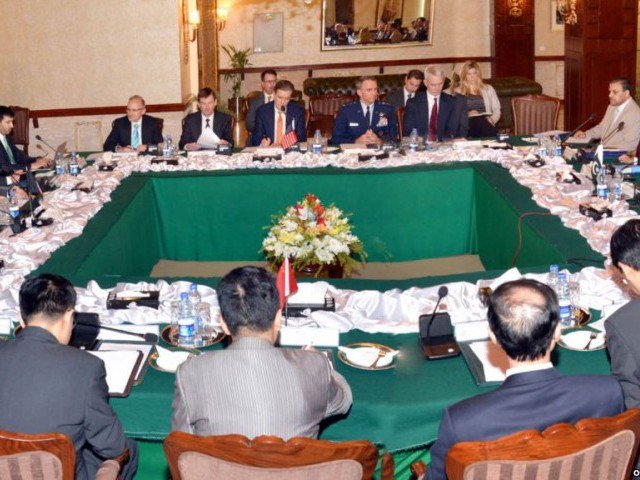
The QGC, which last met in Islamabad early last year, has been trying to ease the path to direct talks between the Afghan government and the Taliban.
Unlike the past, no joint statement was issued after the talks involving Pakistan, Afghanistan, China and the United States. The meeting was held in Muscat, Oman. The venue was selected to avoid media scrutiny and unnecessary hype, said a Pakistani official familiar with the closed door talks.
Quadrilateral meeting begins in Oman with hope for peace in Afghanistan
The official, who wished not to be named since he was not authorised to speak to the media on the subject, told The Express Tribune that the talks in Muscat were aimed at discussing options on how to move forward. Expectations were not high ahead of the meeting since it was taking place after a long gap, the official insisted.
Also, this was the first meeting of the group under the Trump administration, which is apparently relying more on the military option than talks to resolve the 16-year-long conflict in Afghanistan.
The QCG was set up in December 2015 during the Heart of Asia conference in Islamabad. The main aim of the initiative was to make collective efforts for arranging direct talks between the Afghan government and the Taliban.
The group had five meetings before the process met a dead end after Taliban chief Mullah Akhtar Mansur was killed in a drone strike by the US in Balochistan in July 2016.
The four-nation initiative was also marred by differences between its members – including Pakistan and Afghanistan. Kabul used the forum to accuse Islamabad of supporting and harbouring the Afghan Taliban and the Haqqani network. Of late the Ghani administration pushed Pakistan to abandon the option of dialogue and seek action against the Afghan Taliban.
Indian political role in Afghanistan ‘is a red line’, Pakistan tells Washington
Islamabad, however, dismissed the allegations and insisted that the option of use of force would be exercised only after a consensus was achieved among all group members. Pakistan maintained that a mechanism had to be evolved by all the four countries for the military option if efforts to bring the Taliban to the negotiating table failed.
This time, however, Pakistan seemed to have said little about the revival of the QCG. There was no statement issued by the Foreign Office prior to the meeting in Oman. One Foreign Office official pointed out that Pakistan attended the Oman parleys with ‘low expectations’.
Moreover, the official said, given the previous experiences, Pakistan would like to first know whether Afghanistan and the US were interested in the peace process.
Initial reports indicated that the Trump administration was not keen on the revival of the QCG given the new strategy announced by President Trump for Afghanistan and South Asia in August.
However, Washington’s move to send Alice Wells, the Acting Special Representative for Pakistan and Afghanistan, to the Oman talks suggested that the Trump administration was not entirely giving up on the option of peace process.

















COMMENTS (1)
Comments are moderated and generally will be posted if they are on-topic and not abusive.
For more information, please see our Comments FAQ